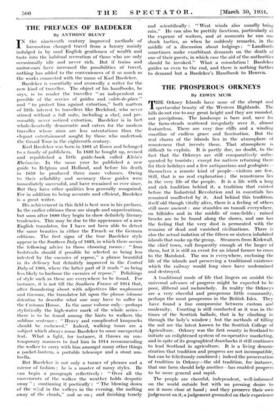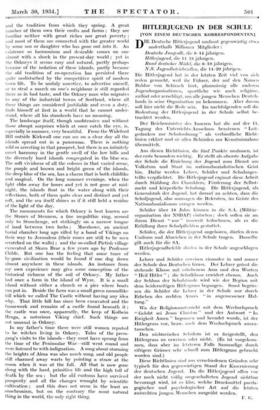THE PROSPEROUS ORKNEYS
By EDWIN MUIR
THE Orkney Islands have none of the abrupt and spectacular beauty of the Western Highlands. The hills do not rise to any great height and they are rounded, not precipitous. The landscape is bare and, save for the farm-steads scattered irregularly over it, almost featureless. There are very fine cliffs and a winding coastline of endless grace and fascination. But the real charm of the islands lies in the atmosphere of remoteness that invests them. That atmosphere is difficult to explain. It is partly due, no doubt, to the fact that the Orkneys are still comparatively unfre- quented by tourists ; except for natives returning there for their holidays and a few antiquarians and geologists— themselves a remote kind of people—visitors are few. Still, that is no real explanation ; the remoteness lies in the very life of the people. It is a life with a long and rich tradition behind it, a tradition that existed before the Industrial Revolution and in essentials has remained unaffected by it. And behind this tradition, itself old though vitally alive, there is a feeling of others still more ancient : one stumbles on tumuli everywhere, on hillsides and in the middle of corn-fields ; ruined broths are to be found along the shores, and one has the feeling that the very dust is permeated with the remains of dead and vanished civilizations. There is also the actual isolation of the fifteen or sixteen inhabited islands that make up the group. Steamers from Kirkwall, the chief town, call frequently enough at the larger of them, but it is still an event for an island farmer to cross to the Mainland. The sea is everywhere, enclosing the life of the islands and preserving a traditional existence which the railway would long since have undermined and destroyed.
A traditional mode of life that lingers on amidst the- universal advance of progress might be expected to be poor, illiberal and melancholy. In reality the Orkneys are a very cheerful and prosperous little community, perhaps the most prosperous in the British Isles. They have found a fine compromise between custom and modernity. Courting is still conducted as it was in the times of the Scottish ballads, that is by climbing in through the lady's window ; but the methods of tiling the soil are the latest known to the Scottish College of Agriculture. Orkney was the first county in Scotland to initiate an enlightened system of co-operative marketing, and in spite of its geographical drawbacks it still continues to lead Scotland in agriculture. It is a living demon- stration that tradition and progress are not incompatible, but can be felicitously combined ; indeed the preservation of tradition in Orkney—the old tradition, for instance, that one farm should help another—has enabled progress to be more general and rapid.
The people are cheerful, independent, well-infOrmed on the world outside but with no presiing desire to see it more close at hand ; and they preserve their own . judgement on it, a judgement grounded on their experience and the tradition from which they spring. A great number of them own their crofts and fartias ; they are familiar neither with great riches nor great poverty ; and most of them are connected with the greater world by some son or daughter who has gone out into it. An existence so harmonious and desirable comes on one almost with a shock in the present-day world ; yet in the Orkneys it seems easy and natural, partly perhaps because of the isolation of these islands, partly because the old tradition of co-operation has persisted there quite undisturbed by the competitive spirit of modern town life. To be unduly assertive, to advertise oneself, or to steal a march on one's neighbour is still regarded there as in bad taste, and the Orkney man who migrates to any of the industrial towns of Scotland, where all these things are considered justifiable and even a duty, finds himself at first in a world that he cannot under- stand, where all his standards have no meaning.
The landscape itself, though unobtrusive and without those abrupt surprises which at once catch the eye, is, especially in summer, very beautiful. From the Wideford Hill outside Kirkwall one can sec on a clear day all the islands spread out in a panorama. There is nothing wild or arresting in that prospect, but there is an infinitely sweet harmony in the gentle swell of the low hills and the diversely hued islands congregated in the blue sea. The soft vividness of all the colours in that varied scene, the purple and brown and bright green of the islands, the deep blue of the sea, has a charm that is both childlike and magical. On the long summer evenings, when the light ebbs away for hours and yet is not gone at mid- night, the islands float in the water along with their reflections, both of them quite clear and distinct and yet soft, and the sea itself shines as if it still held a residue of the light of the day.
The monuments for which Orkney is best known are the Stones of Stennoss, a fine megalithic ring, second only to Stonehenge, set strikingly on a narrow tongue of land between two lochs ; Maeshowe, an ancient burial chamber long ago rifled by a band of Vikings on their way to Jerusalem (their runes are still to be seen scratched on the walls) ; and the so-called Pictish village excavated at Skara Brae a few years ago by Professor Childe. But one has the feeling that some trace of by-gone civilization would be found if one dug down almost anywhere in these islands. An instance from my own experience may give some conception of the historical richness of the soil of Orkney. My father had once a farm in the island of Wyre. It is a small island without either. a church or a pier where boats can put in. Beside the farm was a small green moundlikc hill which we called The Castle without having any idea why. That little hill has since been excavated and the framework and remains of a castle found beneath it ; the castle was once, apparently, the keep of Kolbein Hruga, a notorious Viking chief. Such things are not unusual in Orkney.
In my father's time there were still women reputed to be witches living in Orkney. Tales of the press- gang's visits to the islands—they must have sprung from the time of the Peninsular War—still went round and were listened to with indignation. A song about storming the heights of Alma was also much sung, and old people still charmed away warts by pointing a straw at the moon when it was at the full. All that is now gone along with the hard, primitive life and the high toll of death by the sea ; but the old customs have survived prosperity and all the changes wrought by scientific cultivation ; and this does not seem in the lea$t an anachronism, but on the contrary the most natural thing in the world, the only right thing.









































 Previous page
Previous page